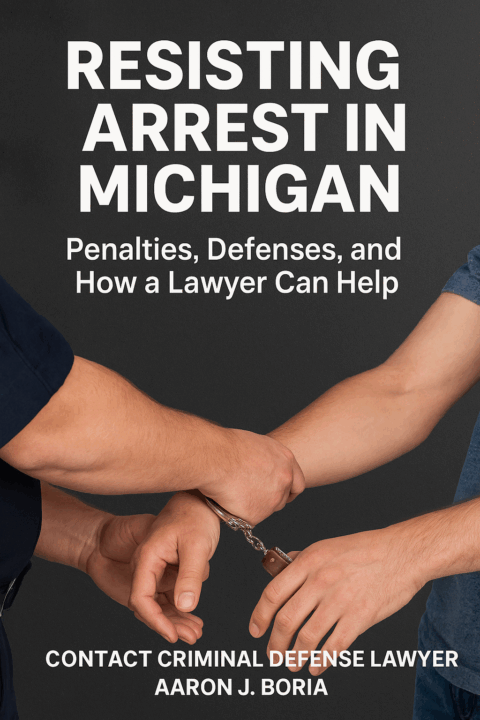
Resisting Arrest Michigan Lawyer
Resisting arrest is a serious felony offense in Michigan, and the penalties depend largely on whether the police officer suffered an injury. The more severe the injury, the more severe the punishment.
Regardless of the circumstances, a resisting arrest conviction carries felony consequences, the possibility of prison time, and significant fines.
If you are facing resisting arrest charges in Michigan, contact criminal defense lawyer Aaron J. Boria today at (734) 453-7806.
Click here to view Aaron J. Boria’s bio.
Resisting and Obstructing a Police Officer: Michigan Penalties
Under Michigan law, a person who assaults, batters, wounds, resists, obstructs, opposes, or endangers a police officer—knowing the officer is performing their duties—commits a felony. Penalties escalate based on injury:
-
No injury: Up to 2 years imprisonment and/or a fine of up to $2,000
-
Bodily injury requiring medical care: Up to 4 years imprisonment and/or a fine of up to $5,000
-
Serious impairment of a body function: Up to 15 years imprisonment and/or a fine up to $10,000
-
Death of the officer: Up to 20 years imprisonment and/or a fine up to $20,000
In simple terms, you can be charged with resisting arrest for physically opposing—or even verbally interfering with—someone you know to be a police officer.
What Is Resisting Arrest in Michigan?
To convict someone of resisting arrest or resisting and obstructing a police officer (R&O), the prosecutor must prove each element beyond a reasonable doubt:
1. You assaulted, battered, wounded, resisted, obstructed, opposed, or endangered a police officer.
You must have actively resisted—through actions or words—but physical violence is not required for a conviction.
2. You knew or had reason to know the person was a police officer performing their duties.
If you did not know the person was an officer, or had no reason to believe they were acting in an official capacity, the charge may fail.
3. The officer suffered an injury (if the prosecutor is pursuing enhanced penalties).
To impose the higher felony penalties, the prosecutor must prove that your actions caused death, serious impairment, or an injury requiring medical care.
Defending a Resisting Arrest Charge in Michigan
There are several strong defenses that can lead to a dismissal, reduction, or Not Guilty verdict in a resisting arrest case.
1. You did not know the person was a police officer.
If the officer was not in uniform, did not clearly identify themselves, or failed to show a badge, the prosecution may be unable to prove this essential element.
Even if the officer verbally claimed to be with law enforcement, a lack of uniform or identification may justify your actions.
2. You did not resist, assault, obstruct, or endanger the officer.
If you did not engage in the conduct described in the statute, the prosecutor cannot meet the first element. This alone can result in a dismissal.
3. The officer was not injured.
If the officer did not require medical attention and no injury occurred, the prosecutor cannot pursue the more serious penalty enhancements.
4. The arrest was unlawful.
Police must have legal grounds to arrest you. If the arrest violated your constitutional rights, you have a legal right to resist.
Michigan courts have recognized that unlawful arrests can justify resistance—and juries often acquit defendants when the police overstep or misrepresent what happened.
Call a Michigan Resisting Arrest Lawyer Today
Every resisting arrest case is different, and the defenses depend on the specific facts of your situation. These are only a few of the many strategies an experienced defense lawyer may use.
If you are facing resisting and obstructing charges, call Michigan resisting arrest defense lawyer Aaron J. Boria at (734) 453-7806. We have successfully defended numerous resisting arrest cases throughout the state and are ready to fight for you.





